To inherit the excellent traditional Chinese culture, strengthen international communication capacity, and enhance the global influence of Chinese civilization, the University of Shanghai for Science and Technology (USST) and the Shanghai Foreign Languages Association (SFLA) jointly held the International Symposium on 'Chinese and Western Philosophy and Overseas Dissemination of Chinese Culture in the New Globalization Era' from July 18 to 20. The first academic event of the 45th anniversary of the establishment of Foreign Language College at USST, this conference was hosted by Foreign Language College, USST, and co-hosted by the (China) Comparative Society of Chinese and Foreign Languages and Cultures, Shanghai Foreign Language Education Press, the editorial department of 'Chinese Comparative Literature', and the editorial department of 'Journal of USST (Social Sciences Edition)'.
Relying on the century-old educational tradition of USST, integrating philosophy, culture, and literature, This academic conference gathered more than 100 experts, scholars, teachers, and students from China, the United States, Britain, Canada, and other countries in related fields to jointly discuss the interaction, mutual learning, and new paths of communication between Chinese and Western cultures in the context of new globalization, aiming to promote the wisdom of Chinese philosophy, to enhance the influence and appeal of traditional Chinese culture on the international stage, and to promote the harmonious coexistence and prosperous development of global culture in the new era.
At the opening ceremony, Zhang Hua, the Vice President of USST, delivered a welcome speech. He introduced the educational mission and characteristics of USST, especially its historical accumulation in the field of humanities research, as well as the rapid development in various disciplines in recent years and the emphasis on the combination of high technology and humanities research. He hoped that all the scholars present at the conference could discuss the potentials of the mutual dissemination of Chinese and Western cultures.
On behalf of the co-organizers, Zha Mingjian, Vice President of Shanghai International Studies University (SISU) and President of the Shanghai Foreign Literature Association, delivered a speech. He cherished the memory of Professor Cheng Zhongying, the initiator of the conference, and discussed the issue of international dissemination of Chinese culture from the perspective of Chinese and Western philosophy. He believed that in the new era of globalization and artificial intelligence, we need to combine the Chinese culture with the global consciousness to carry out cultural exchanges between China and foreign countries.
Liu Qin, Dean of Foreign Language College at USST and Executive Vice President of the Shanghai Institute of Public Diplomacy, delivered a speech on behalf of the organizers. She introduced the history of Foreign Language College, expressed deep condolences for the passing of Professor Cheng Zhongying, Honorary Director of the Institute of Chinese and Foreign Cultural Studies at the college, and expressed her belief in forging ahead.
Sun Yu, President of Shanghai Foreign Language Education Press, and Song Binghui, Editor-in-Chief of 'Chinese Comparative Literature,' delivered speeches on behalf of the co-organizers. Sun Yu emphasized the importance of cultural exchanges between China and foreign countries, saying that Shanghai Foreign Language Education Press would deeply explore the value of philosophy and literature from the perspective of communication practice. Song Binghui believed that in the 'new era' of globalization, it was particularly important to carry out cross-cultural dialogue and international research on the interaction, mutual learning, and mutual dissemination of Chinese and Western cultures. The opening ceremony was presided over by Zhang Le, Vice Dean of the Foreign Language College at USST.
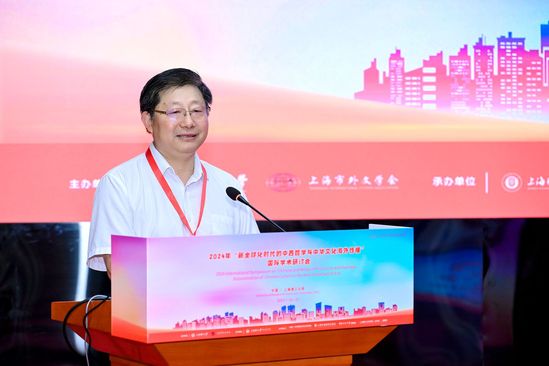
Zhang Hua delivered a welcoming speech
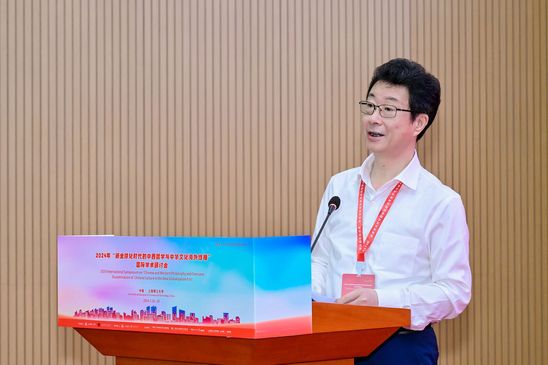
Zha Mingjian delivered a speech
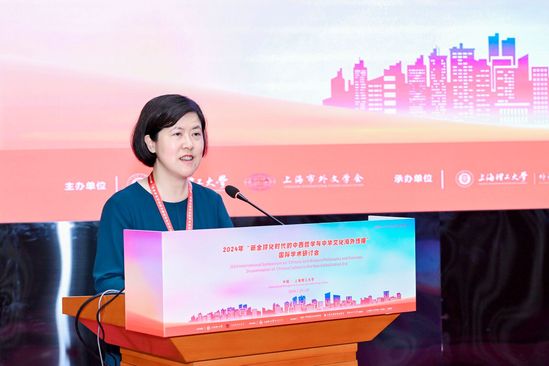
Liu Qin delivered a speech
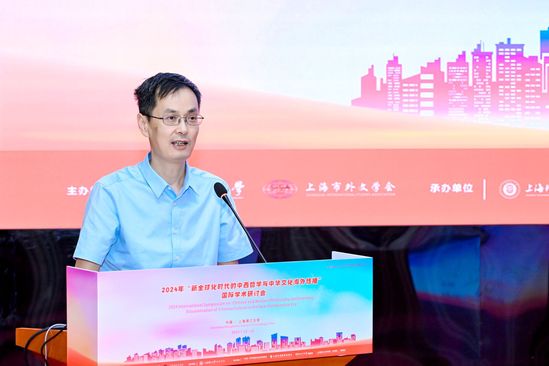
Sun Yu delivered a speech
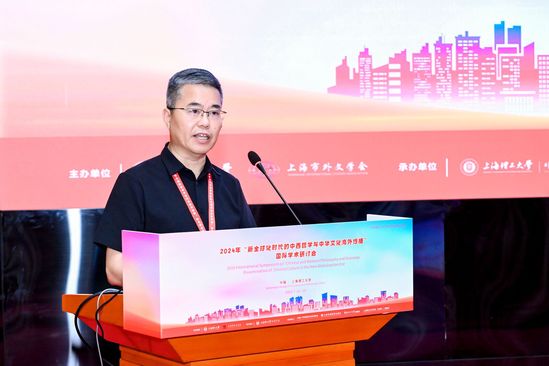
Song binghui delivered a speech
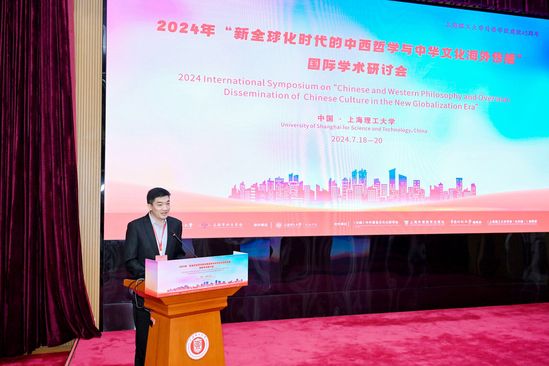
Zhang Le hosted the opening ceremony
During the conference, the participating experts conducted in-depth exchanges and discussions on such topics as 'Comparative Philosophy between China and the West and Chinese Philosophy Research', 'The Unique Charm of Chinese Culture in the Dialogue between China and the West', 'Comparative Literature and Anglo-American Literature Research', 'Chinese and Foreign Language Culture Research', 'The Current Situation of Internationalization Research of Traditional Chinese Culture', and 'Research on the Overseas Dissemination of Chinese Civilization and Its Strategies'. Many well-known scholars delivered wonderful speeches, sharing the latest research results and unique insights, providing valuable academic resources for the deep-level exchange and mutual learning between Chinese and Western cultures.
Recently, Professor Cheng Zhongying passed away. Professor Cheng was the initiator and the late chairman of the conference, distinguished professor of USST, honorary director of the Institute of Chinese and Foreign Cultures at Foreign Language College, USST, tenured professor at the University of Hawaii, and academician of the International Academy of Hermeneutics. Entrusted by Professor Gu Linyu, the wife of Professor Cheng, the organizing committee of the conference held a memorial service after the opening ceremony. Friends and colleagues of Professor Cheng from all over the world came to mourn him. Pan Song, assistant editor of the 'Chinese Philosophy Quarterly', served as the host. Chen Bo, chair professor of humanities and social sciences at the School of Philosophy, Wuhan University, Liu Weijian, director of the Research Center for Chinese Studies at the Beijing Academy of Social Sciences, and Jiang Yi, honorary director of the Chinese Modern Foreign Philosophy Society, respectively introduced Professor Cheng's contributions to Western philosophy, Chinese philosophy, and comparative philosophy between China and the West. Professor Chen Weiping, Professor Pan Derong, and Mr. Shi Yongmin, friends of Professor Cheng Zhongying, also delivered a mourning speech.
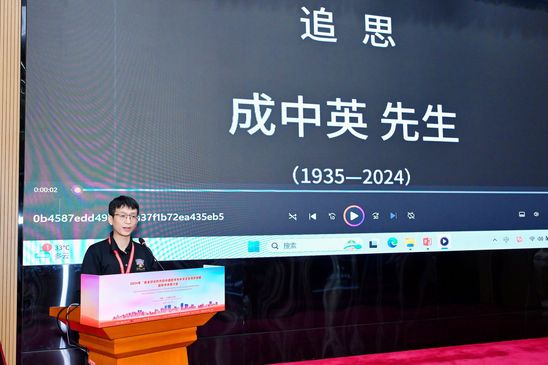
Pan Song chaired the memorial service
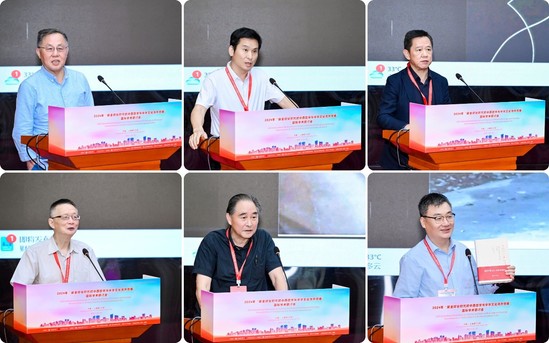
Mourning speeches
Fifteen renowned professors were invited to serve as keynote speakers, focusing their topic on 'mutual learning among civilizations.' Prior to the conference, Professor Cheng and his wife entrusted their special assistant, Professor Andrew Fuyarchuk of Yorkville University in Canada, to read their report. Professor Cheng's keynote speech presented the latest findings in the study of naturalized epistemology by philosopher Quine, comparing it with the thoughts of Descartes, Kant, and Gadamer. He applied naturalism and the philosophy of change from the Book of Changes to a new interpretation of contemporary quantum mechanics, expanding the research in this field. Professor Gu, the wife of Professor Cheng, discussed the coexistence of traditional cultural barriers between the East and West under the theme 'Philosophical Reflections on the Current World Situation.' Professor Chen Zhongyi, a member of the Chinese Academy of Social Sciences, delved into the 'Axial Age' and its significant impact on ancient cultural development, pointing out that civilizations such as those in the Tigris-Euphrates region, Egypt, and India all had a profound influence on ancient Greece.
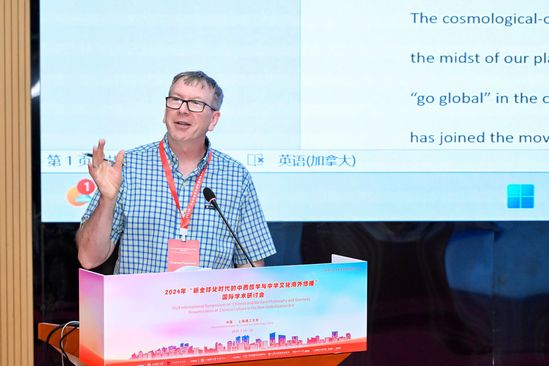
On behalf of professor Cheng Zhongyin, Andrew Fuyarchuk delivered a keynote speech
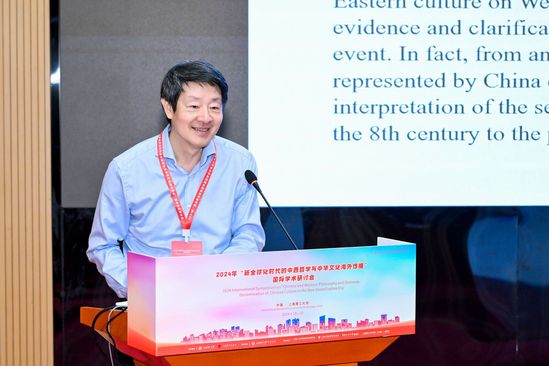
Chen Zhongyi delivered a speech
Professor Wu Di, President of the Chinese Society for Comparative Linguistics and Cultures, believes that the Chinese poetry anthology in the 'Chinese Humanities Classics Series' jointly launched by the United States and Germany marks a new stage in the international dissemination of Chinese poetry. Professor Carlin Romano of the University of Pennsylvania compares the similarities and differences between Chinese and Western philosophy, arguing that Chinese scholars are more open to the acceptance of Western philosophy, and that Eastern and Western philosophy should learn from each other. Professor Chen Bo believes that Chinese culture currently faces the dual challenges of promoting cultural globalization and constructing an independent Chinese discourse system, questioning the 'interpreting China through China' model. Professor Jiang Yi believes that Western philosophy has been introduced into China for more than a century, while Chinese philosophy has a longer history of spreading to the West, predicting the new prospects of Chinese philosophy in the West under the 'three-in-one' strategy. Liu Jianjun, a distinguished professor at Shanghai Jiao Tong University, proposes that the Byzantine Empire, as the cradle of cultural collision and exchange between East and West, has created a profound example of cultural integration and mutual learning between civilizations. Professor Zhu Zhenwu, President of the Fiction Research Committee of the Chinese Society for Comparative Linguistics and Cultures, analyzes the translation concepts of sinologists and proposes strategies to optimize the 'going global' of Chinese culture.
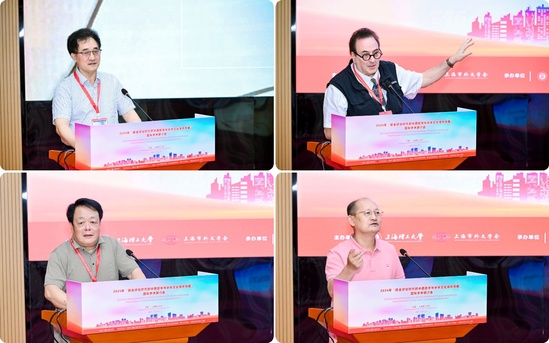
Professor Wu Di(Top Left), Carlin Romano (Top Right)、Liu Jianjun (Bottom Left)、Zhu Zhenwu (Bottom Right) delivered keynote speeches
Professor Peter Kitson, Honorary Professor of the University of East Anglia, outlined the influence of Chinese culture on British literature from the late 18th century to the early 19th century, which profoundly changed the cultural perception of China in Britain. Professor Li Yong, Vice Dean of the School of Philosophy at Wuhan University, believes that global justice is a core issue in philosophy and proposes 'Tianxia (one world)' as the third model of global justice. Professor Chris Fraser, Chair Professor at the University of Hong Kong, believes that cross-cultural philosophical dialogue in recent decades has broadened the horizons of philosophical research and will lead us towards new philosophical directions. Professor Li Anze of Heilongjiang University believes that we should understand the identity of human cultural roots and provide a new perspective for the deep integration of Chinese and Western cultures. Professor Liu Weijian, based on his practice of spreading Chinese culture overseas, combed out the civilizational characteristics of Chinese culture. Professor Yu Xixia, Director of the Institute of Chinese and Foreign Cultures at our college, discussed the world icons of China's splendid culture, which include the Tang poem 'Night Mooring at Maple Bridge' containing Confucian, Taoist, and Buddhist thoughts and the representative Chinese artifacts of Song porcelain embodying the characteristics of modernist literature in Britain and the United States.
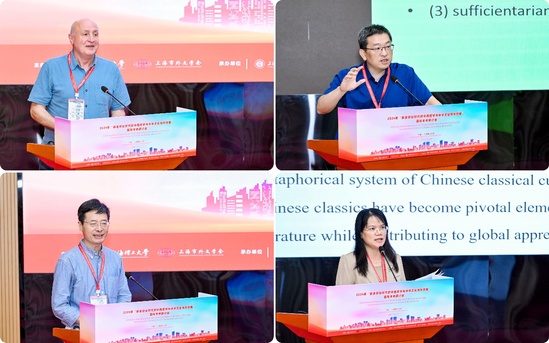
Peter Kitson (Top Left), Li Yong (Top Right) , Li Anze (Bottom Left) , Yu Xixia (Bottom Right) delivered keynote speeches
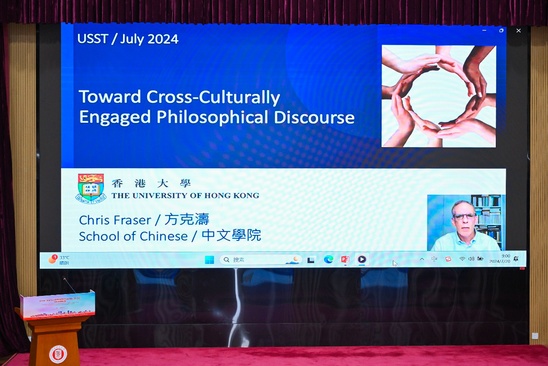
Chris Fraser’s online keynote speech
The conference gathered experts and scholars from multiple academic fields. Their discussions not only demonstrated the cutting-edge research achievements in their respective fields, but also provided a valuable platform for ideological collision and exchange for the academic community to explore new perspectives of mutual learning among civilizations. They pointed out that the diversity of civilizations not only enriched the history of human beings, but also had great significance for us to understand and respect different cultures today. Professor Lu Lian, Vice President of the Shanghai Foreign Literature Society and a professor at Fudan University, delivered a concluding speech titled 'The Trend of Humanities in Chinese Universities in the Current Context', Professor Lu fully affirmed the academic value of philosophy, literature, and history covered in the conference, and advocated the development of cross-cultural and cross-national research on pluralistic humanities, public humanities, and positive humanities.
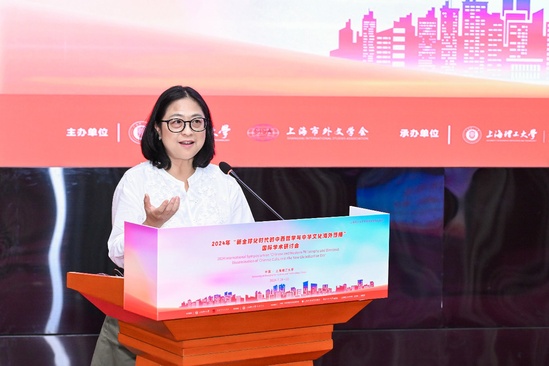
Professor Lu made a concluding speech
With the deepening development of globalization, the importance of cultural diversity and cultural exchange has become increasingly prominent. The successful holding of this international seminar is not only an active response to the spirit of the 20th National Congress of the Communist Party of China, but also a practice of the concept of building a community with a shared future for mankind. The participating experts unanimously agreed that by strengthening the dialogue and exchange between Chinese and Western cultures, mutual understanding and respect among people of various countries can be enhanced, the diversity and prosperity of world culture can be promoted, thus contributing to wisdom and strength to the realization of long-term peace and prosperity of mankind. USST will continue to uphold the spirit of openness, inclusiveness, and mutual learning, deepen exchanges and cooperation with domestic and international academic communities, jointly promote the international dissemination of excellent traditional Chinese culture, and contribute more cultural strength to the construction of a community with a shared future for mankind.
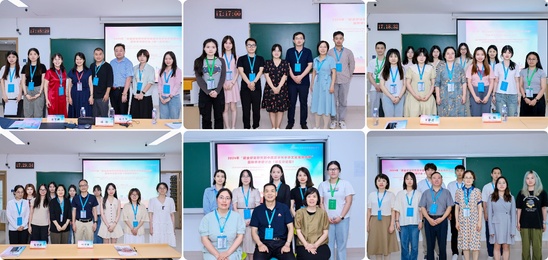
Session discussion
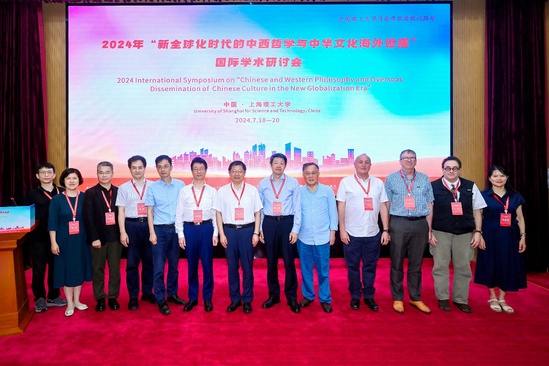
Group photo
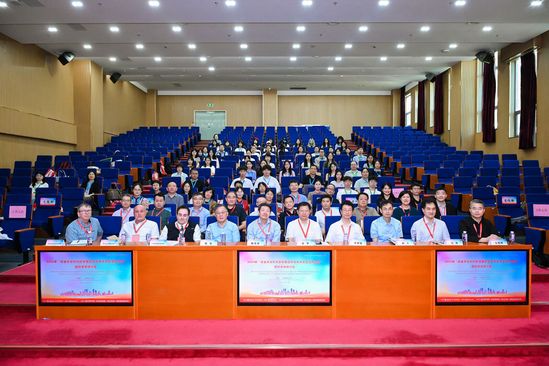
Group Photo
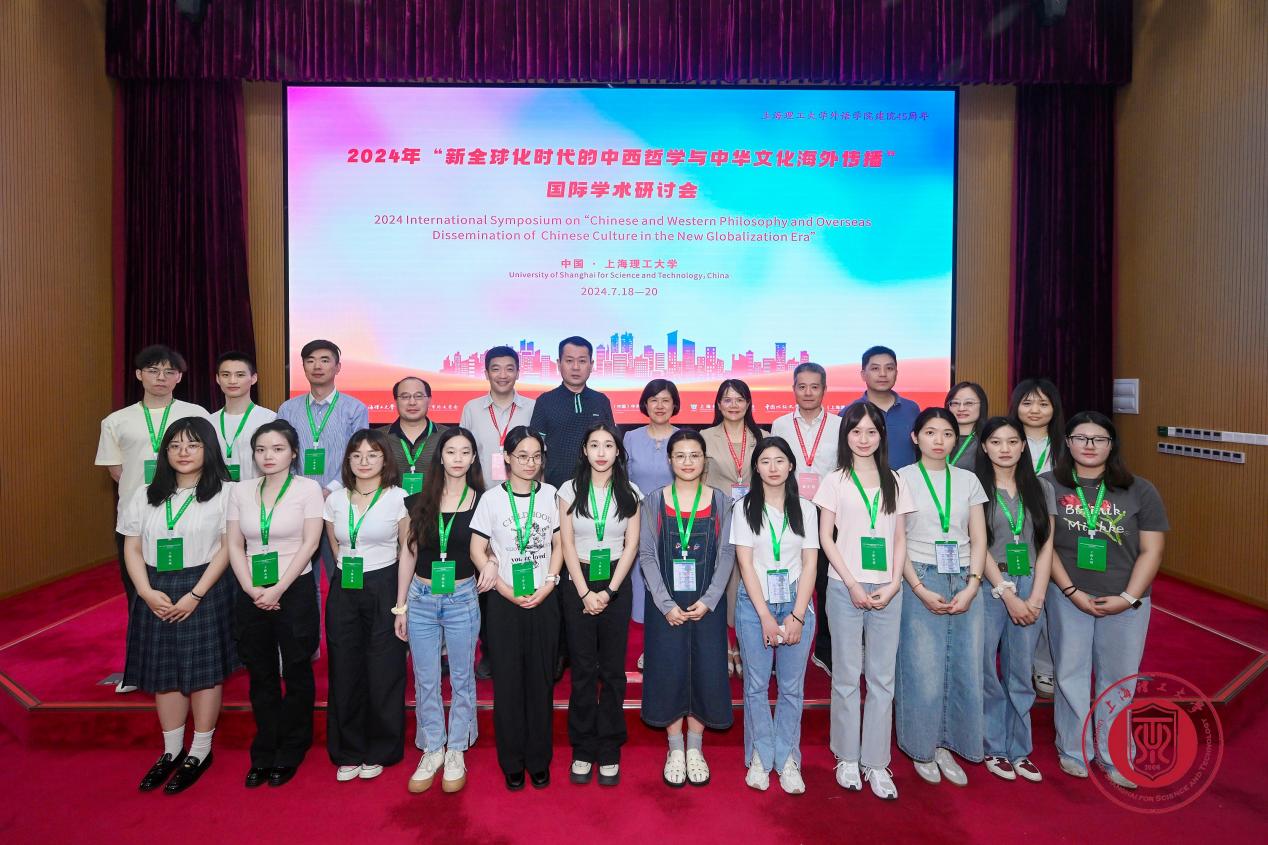
Staff and volunteers


